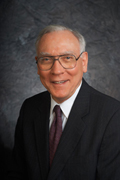Financial Transparency is Needed for the Welfare of the Developing World

Raymond Baker is the Director of Global Financial Integrity and was one of the excellent keynote speakers at the District 5020 Conference in Victoria last June.
Despite massive amounts of foreign aid streaming into transitional economies, many countries fail to develop to the point that they no longer need aid. Baker argues that one reason for this is that illicit capital flows inhibit a country’s ability to grow out of poverty. For every $1 poor nations receive in foreign aid, an estimated $10 in dirty money flows illicitly abroad. With such great amounts of capital draining from weak economies there is little hope of significant development or of curtailing poverty. Without mechanisms to curtail illicit cash flows, the benefits of foreign aid are undermined and the potential for drug cartels and terrorist groups using the banking system to their advantage is greatly increased. It is estimated that 18 million people around the world die annually from economic deprivation.
He noted that the shadow financial system handles approximately half of international financial flows. Lack of financial transparency in many wealthy countries allows this to continue. More than half of the illicict flow is due to commercial tax evasion. Crime, corruption, and tax evasion cost the developing world $858.8 billion in 2010, just below the all-time high of $871.3 billion set in 2008—the year preceding the global financial crisis. Developing countries lost $5.86 trillion in illicit financial flows from 2001-2010.
Mr. Baker is the author of Capitalism’s Achilles Heel: Dirty Money and How to Renew the Free-Market System, published by John Wiley & Sons and cited by the Financial Times as one of the “best business books of 2005.” The book demonstrates that the problem of illicit financial flows, and the financial infrastructure supporting it, is enormous. For example, some 70 tax havens and secrecy jurisdictions are in operation across the globe and millions of dummy corporations shield owner’s identities. And the scourge of dirty money is getting worse. Indeed, global corruption has not diminished despite ten years of effort, assets now stashed in tax havens around the globe are estimated at $11.5 trillion, and non-bank cash deposits outside the country of origin are rising.
Baker maintains that "transparency-based reform accomplishes far more, far faster, than regulation and oversight." He has three major recommendations: 1) eliminate secrecy of ownership; 2) require cross-border financial institutions and multinational corporations to report their results on a country-by country basis; and 3) jurisdictions should automatically exchange tax information across borders (as is done between Canada and the USA, for example). Baker suggests that the updated UN Millenium Goals include recommendations to curb the shadow financial system and reduce economic deprivation.
Global Financial Integrity was launched in September 2006 following the publication of his book.
Raymond Baker has for many years been an internationally respected authority on corruption, money laundering, growth, and foreign policy issues, particularly as they concern developing and transitional economies and impact upon western economic and foreign interests. He has written and spoken extensively, testified often before legislative committees in the United States, Canada, and the United Kingdom, been quoted worldwide, and has commented frequently on television and radio in the United States, Europe, and Asia on legislative matters and policy questions, including appearances on Nightline, CNN, BBC, NPR, Four Corners, and GloboNews, among others.
Mr. Baker is a Senior Fellow at the Center for International Policy in Washington, D.C., researching and writing on the linkages between corruption, money laundering, and poverty. He is also a member of the High Level Panel on Illicit Financial Flows from Africa, chaired by former President of South Africa, Thabo Mbeki.
Download the website sponsorship guide


